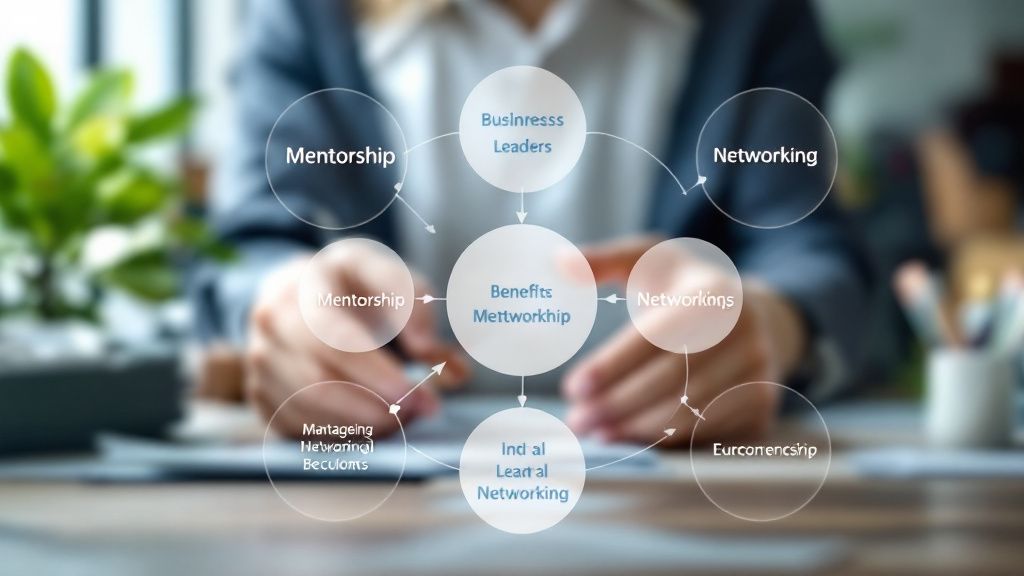Book Free Consult Call
Cultivating effective business leadership is a dynamic journey that fuels both company prosperity and individual evolution. By embracing transformational leadership, you harness strategies that inspire and motivate, encouraging a thriving workplace culture. As a business leader, engaging in business coaching enables you to sharpen decision-making skills and enhance interpersonal relationships. It's important to focus on professional development, which provides opportunities for growth and equips you with the latest tools and methods necessary to lead successfully. Embracing self-improvement tips not only benefits your personal growth but also positively impacts your leadership capabilities, helping you foster a resilient and innovative business environment. As you embark on this path, you will see how transformational leadership principles and targeted coaching make your leadership journey impactful and rewarding.

The essence of leadership lies in the ability to inspire and guide others toward a shared vision. In transformational leadership, you develop trust and collaboration, empowering your team to exceed expectations. This style of leadership transcends traditional management, focusing on change and innovation. As you embrace this approach, you realize that leadership is not just about authority, but about being a catalyst for growth and development.Venturing into business coaching can further enhance your understanding of leadership. This practice allows you to refine your skills through targeted guidance and feedback. As you work with a coach, you gain insights into your strengths and areas for improvement. Professional development resources likewise expand your techniques and keep you informed of the latest trends, helping you become a more effective and adaptable leader.Incorporating self-improvement tips into your daily routine is integral to honing your leadership skills. This fosters a mindset of continuous learning and adaptability, vital in navigating the ever-changing business landscape. By focusing on personal growth, you prepare to handle challenges with resilience and poise. As your awareness and abilities expand, you become better equipped to drive your team towards success.In the coming years, leadership styles are expected to pivot towards more inclusive and empathetic approaches, aligning with global shifts towards collaborative environments. Understanding these trends will position you at the forefront of meaningful change, making your leadership invaluable in a rapidly evolving world.

Training serves as the foundation for developing leadership skills essential for driving personal and organizational success. Participating in leadership courses and workshops allows you to explore various styles, such as transformational leadership, to discover what resonates best with you. These programs offer a blend of theory and practical exercises, enabling you to apply concepts in real-world scenarios for meaningful and effective learning experiences.Engaging in business coaching is another avenue for enhancing your leadership skills. Personalized coaching sessions provide tailored feedback and strategies that address your specific needs and challenges. The mentorship you receive helps you refine decision-making abilities and nurture confidence in your leadership role, ultimately fostering professional development that sets you apart from your peers.What most people don’t see about leadership training is the behind-the-scenes network of support and collaboration that makes all the difference. By connecting with fellow participants and trainers, you build relationships that offer guidance, encouragement, and varied perspectives. This community is instrumental in your journey, as it surrounds you with individuals who understand and support your growth.Incorporating self-improvement tips from training into your daily practice enhances your adaptability and resilience. By consistently refining your skills and approaches, you maintain a sharp edge in the fast-paced business world. This ongoing development ensures that you can lead effectively, inspire your team, and navigate challenges with confidence.

Mentorship can be a transformative experience for personal and professional growth. By seeking guidance from seasoned leaders, you gain insights that help navigate complex situations and refine your leadership style. A mentor supports your journey by sharing their experiences, providing feedback, and offering a fresh perspective. This relationship equips you with valuable tools and self-improvement tips that greatly enhance your capacity for transformational leadership.Networking strategies play a crucial role in expanding your professional circle and opening doors to new opportunities. By engaging with others in your industry, you build connections that can lead to collaborations, knowledge sharing, and new business ventures. Participating in networking events or online platforms fosters relationships that are mutually beneficial, contributing to your professional development.Looking at mentorship and networking through the lens of lifelong learning, we can see that both offer continuous growth opportunities. By actively seeking mentorship and cultivating your professional networks, you create a support system that is essential in adapting to changes and challenges. This unique perspective underscores the importance of maintaining relationships that encourage growth and innovation, ensuring you remain adaptable and effective in your leadership journey.Combining mentorship and networking strategies enables you to learn from diverse perspectives and experiences. These interactions contribute to developing a broader understanding of transformational leadership, empowering you to inspire others and drive organizational success. Learning from peers and mentors alike fosters a balanced approach to leadership development, reinforcing the interconnectedness of mentorship, networking, and transformative leadership in your career.

Personal growth significantly influences your leadership effectiveness by enhancing your self-awareness and resilience. As you invest in self-improvement, you develop a deeper understanding of your strengths and areas for growth. This journey fosters qualities such as empathy, adaptability, and confidence, which are crucial for transformational leadership, enabling you to motivate and uplift those around you.Self-improvement tips and resources play an integral role in this journey, offering practical guidance for ongoing development. Engaging in activities such as mindfulness, business coaching, and continuous learning sharpens your ability to manage stress and make informed decisions. This proactive approach to personal development empowers you to lead with clarity and purpose.On one hand, some view personal growth as an individual endeavor focused solely on self-betterment, while others argue that it also creates a ripple effect that enhances leadership capabilities. The contrasting perspective emphasizes that as you evolve personally, you naturally influence your team and organization, driving positive change through the embodiment of strong values and innovative thinking.The synergy between personal growth and professional development becomes evident as you navigate your leadership role. By embracing both elements, you cultivate a holistic leadership style that is dynamic and responsive to the needs of your team. This integration of personal and professional growth fuels your ability to lead with authenticity and vision, fostering a thriving environment for success.

Achieving a balance between work and personal life is crucial for sustaining both leadership effectiveness and personal well-being. Recognizing the importance of setting boundaries allows you to allocate time and energy to both professional responsibilities and personal interests. This balance enhances your capacity to lead with focus and determination, creating a positive work environment that reflects your commitment to transforming leadership practices.Incorporating self-improvement tips into your routine helps maintain this equilibrium. Activities like regular exercise, mindfulness, or hobbies can provide a necessary break from work pressures, fostering mental clarity and resilience. As a leader, embracing these habits supports your professional development, helping you manage stress and maintain a healthier work-life balance.To make the most of balancing your work and personal life, try creating a structured schedule to prioritize tasks effectively. Allocating dedicated time for work and personal activities ensures that you meet professional obligations while dedicating time to family and hobbies. This strategic approach encourages a harmonious integration of personal and professional aspirations.Business coaching can also support your journey by offering guidance on time management and boundary setting. Engaging in coaching sessions helps cultivate strategies that enable you to lead effectively while maintaining personal fulfillment. By balancing these aspects, you create a foundation for sustained success and satisfaction in both areas of life.

Building a resilient leadership style is essential for navigating the challenges and uncertainties in today's business world. By embracing techniques from transformational leadership, you inspire your team to adapt and innovate. This style promotes emotional intelligence and flexibility, enabling you to remain calm and decisive even when faced with adversity. Developing these traits strengthens your ability to lead with confidence and purpose in dynamic environments.Resilience can be further developed through professional development opportunities, such as business coaching. These sessions provide personalized strategies to enhance your leadership methods, focusing on building emotional strength and stress management. Engaging in regular coaching allows you to refine your approach, ensuring that your leadership style remains robust and effective under pressure.Comparing resilient leadership vs traditional command-and-control approaches highlights the benefits of flexibility and adaptability. While traditional methods focus on authority, a resilient style encourages collaboration and empowerment. This comparative analysis demonstrates how a resilient approach fosters a culture of trust, creativity, and shared responsibility, driving your team to achieve collective goals while maintaining morale and engagement. Emphasizing resilience as a core component of your leadership style ultimately prepares you to guide your organization through any challenge.
Stay up to date on all things business, stratgey, leadership growth, and more by subscribing to the TruNorth Newsletter.